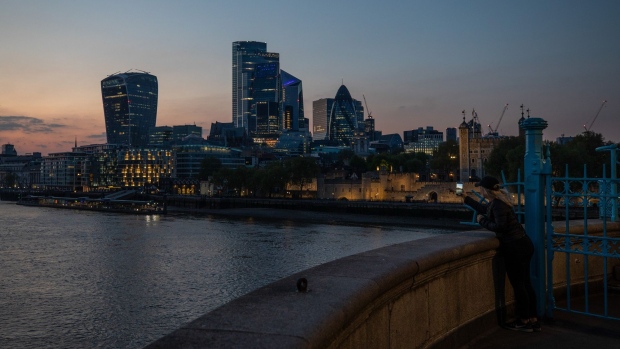Jul 12, 2020
U.K. Business Urged to Prepare for End of Brexit Transition
, Bloomberg News

(Bloomberg) -- Boris Johnson’s government will launch a campaign Monday to urge businesses to prepare for the end of the Brexit transition period on Dec. 31, as a survey showed only a quarter of directors said their companies were fully ready.
Although Britain left the European Union on Jan. 31, it has since been in a no-change relationship, designed to allow both sides to prepare for what comes next -- and talks on that question are deadlocked. Cabinet Office Minister Michael Gove on Sunday announced plans to spend 705 million pounds ($890 million) on new border infrastructure, less than six months before it needs to be in place.
But the government also needs businesses to prepare. A survey by the Institute of Directors published Monday found 45% saying they were unable to do so, largely because of the impact of coronavirus, but also because the nature of Britain’s future relationship with the EU remains unclear.
“With so much going on, many directors feel that preparing for Brexit proper is like trying to hit a moving target,” Jonathan Geldart, director general of the IoD, said.
An advertising campaign will direct people to a new government website giving advice on preparations. With Johnson pledged to take Britain out of the single market and customs union, much of the advice is unlikely to change whatever the U.K. and EU agree on.
A leaked letter from Trade Secretary Liz Truss last week set out her department’s concerns about the government’s post-Brexit border plans, including an increased risk of smuggling and a possible challenge from the World Trade Organization. Speaking to the BBC on Sunday, Gove said there was no disagreement in the government and it was time to “get cracking on implementation.”
Read more: Leaked Truss Letter Makes Case for Extension
Added Costs
Although Gove emphasized the “opportunities” he said would exist for U.K. businesses outside the EU, ministers are now preparing them for increased costs. The website offers advice on how to hire a business with a base inside the EU to handle the new customs bureaucracy that will be involved in moving goods across the English Channel.
The government’s new border arrangements will focus on smart infrastructure, Gove said, without elaborating further.
The government has purchased a 27-acre site about 20 miles (32 kilometers) from the port of Dover for “holding” delayed goods vehicles, The Guardian reported Friday. “It’s not the intention to create a massive concrete lorry park,” Gove told the BBC.
The U.K.’s plans for its border with Ireland will be published later this month, according to Gove. While the prime minister has insisted there will be no checks on goods moving between Northern Ireland and Great Britain, Gove said there would probably be “one or two rather simple processes.”
Also coming Monday, Home Secretary Priti Patel will set out changes to the U.K.’s immigration system that her office said were designed to cut the number of low-skilled migrants, but make it easier for higher-skilled workers to come. The most significant change is that EU citizens will no longer be able to live and work in the U.K. without a visa.
©2020 Bloomberg L.P.